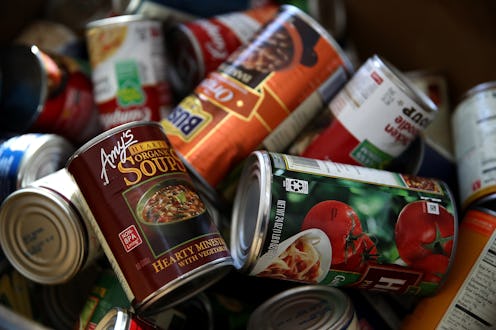Life
12 Items Your Local Food Bank Can’t Accept

The holiday season can be a beautiful time of year to reflect on the people, values, and causes you care the most about. And it’s also the perfect opportunity to give back to your communities in whatever ways you can. Whether you donate time, funds, or food, this is an important time of year to focus on the value of serving others. Food donation drives offer a powerful way to help community members while fighting hunger — but you might not know that there are some things that you should never donate to a food bank.
Since your local food bank workers value your desire to give in whatever ways you’re able to, they probably won’t come right out and tell you that there are some items that they can’t use when you drop your donation off. So, it’s helpful to know how to make your gift as useful as possible as you select what you’d like to give this year.
"As a general rule, donate items that you would be willing to receive and cook," Feeding America's Director of Communication, Zuani Villarreal tells Bustle via email. "If your pantry was empty, what would you want to find in there so you could prepare a healthy, nutritious meal for your family?"
In order to guide your giving efforts in the most helpful direction possible, here are 12 items you should not donate to your local food pantry this holiday season.
1Dented Or Damaged Items
Dented, rusted, or damaged packaging means that the food inside might be spoiled, notes Delish. Make sure to examine packaging for signs of damage before you drop your food donation items off.
"Food safety is a top priority at the Feeding America network of 200 food banks. Dented or damaged cans could be spoiled or contain harmful bacteria. Any cans that are badly dented, leaking, bulging, or rusted should be thrown out," suggests Villarreal.
2Expired Foods
Any expired foods might not be safe to eat, so make sure to leave these out of the food bank's donation drop-off bin. Food bank workers typically throw expired items out in order to avoid any risk to community members' health, Villarreal says.
3Anything With Opened Packaging
Similar to damaged or expired goods, any foods with open packaging won't be distributed during food drives for safety reasons, Villarreal says. When shopping for donation items, make sure to choose fresh foods with undamaged and unopened packaging, and donate before the expiration date is up.
4Items Packaged In Glass Containers
Glass packaging is breakable, so food banks prefer less fragile donations. "Food in glass jars could easily shatter in the donation bin or during transport," says Villarreal. "So, for safety reasons, please avoid donating items in glass jars."
5Foods That Need Can Openers & Special Equipment
Canned goods that need a can opener, or any foods that require special equipment to make, are not recommended as food donations. Easy-to-open canned items with pop-up pull tabs are a better choice.
6Dairy Foods
Any food that isn't shelf-stable is not the preferred choice for food donations, and most food banks are unable to take fresh dairy products like milk, cheese, or yogurt.
7Baby Formula
Baby formulas, and baby foods in breakable glass jars, aren't recommended for donation to food banks, Delish reports. Most food banks buy specific formulas for their local communities with donated funds. Baby formulas also expire quickly.
8Bulk Items
Bulk foods require repackaging in order to distribute, and most food banks don't have the resources to repackage bulk items for the families that they serve. For food donations, it's best to stick with boxed and prepackaged items.
9Homemade Foods
It might seem like a caring gesture to gift homemade foods for your local food drive, but food banks can't accept any foods that aren't commercially packaged.
10Fresh, Perishable, Or Frozen Foods
Any foods that can spoil easily, or require refrigeration, might not work for your local food bank. Some facilities do have refrigerators and freezers, while others don't, so make sure to check before dropping your donation off.
11Unlabeled Packaged Foods
Villarreal advises that "All foods donated must be properly labeled, and that label must be legible." Scan all food packaging before you donate, and make sure that the branding, nutritional information, and ingredients listings are all in tact and easy to read.
12Condiments & Special Ingredients
"Food bank volunteers try to put together food boxes that include food staples, and will add extra ingredients to help round out the box," Villarreal says. "But without a complete meal plan, there are only so many cans of water chestnuts or capers you can use."
13
Donating food is one of the most powerful ways to lend support to your community during the holiday season, and all year round, too. By making sure that your donations are aligned with what your local food bank actually needs, you can make sure that your gift is as helpful as possible. And that's definitely something to feel good about.